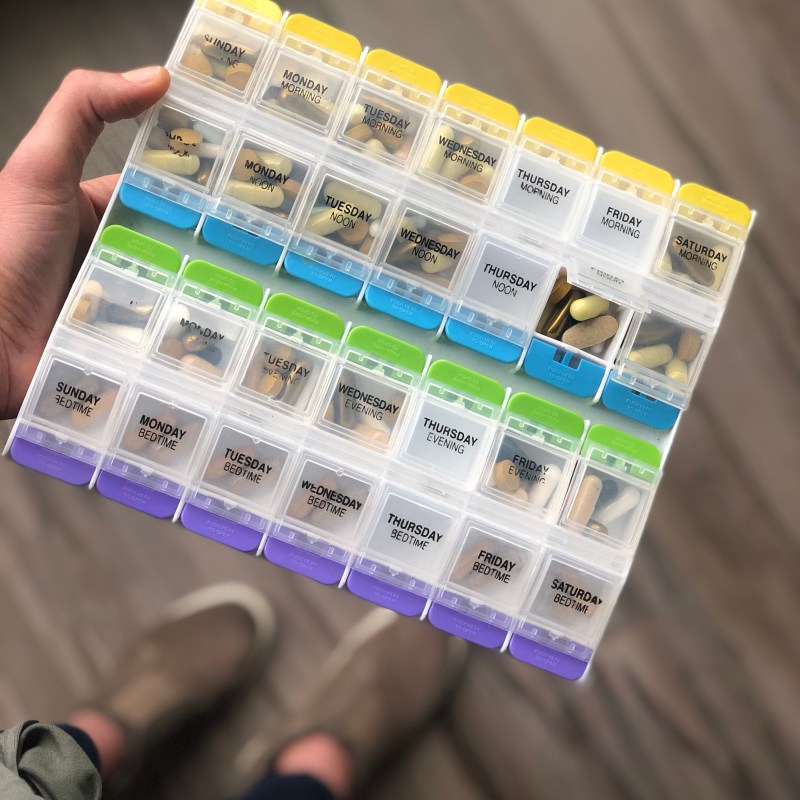Do we really need supplements? I’m a big fan of getting the nutrients you need from your food. In a perfect world, this would happen effortlessly as we consume nutrient-dense animal products (including organs!), a variety of organic fruits & vegetables, high-quality fats and a plentitude of fish.
But, alas, our modern food environment is so different than the world of our ancestors that supplements can be a helpful tool to “fill the gaps” created.
What are those ‘gaps’? We are exposed to food and environmental toxins from pesticides, medications, and industrialization. We are under increased stress. We have a decrease in sleep quality. We have a reduced connection with nature. We are more sedentary.
All of these things mean we use up our inherent stores of nutrients (or consume less of them); and adding supplements can be a way of hacking our physiology to live longer, happier lives.
Further, certain nutrients are harder to obtain even from a healthy diet (like Vitamin D and Magnesium). Depending on your health status, this list may include things like Vitamin A, K2, Selenium, and Omega-3s.
Related: Mindful Eating: Finding a Healthy Relationship with Food

So, What are the top supplements to complement a healthy diet?
MAINTENANCE SUPPLEMENTS
The key nutrients that I consider for “maintenance” are the ones deficient in most Americans’ Diets. There is very little danger in ‘overdoing it’ with these things and I find them a useful adjunct to a nutrient-dense, whole foods diet.
My top five list is an Omega-3 Supplement, Vitamin D3/K2, Magnesium, Digestive Enzymes, and a Pre-/Pro-biotic.
1. Omega-3
A high-quality fish oil provides essential omega-3 fatty acids, EPA and DHA. These fats act as inflammation resolvants (meaning they are potently anti-inflammatory). Additionally, omega-3 fatty acids are important for proper cardiovascular, respiratory, immune, brain and musculoskeletal health. We simply do not consume enough fish to adequately support omega 3 to omega 6 balance in our diet. Curious about your Omega balance? Check out this at-home test.
2. Vitamin D3 with K2
It is estimated that 88% of the population has less than optimal levels of Vitamin D. This Vitamin is necessary for bone integrity, proper neuromuscular function, normal inflammatory response, muscle strength, calcium absorption, immune response, and mood.
Although we are able to produce Vitamin D by converting sunlight, a number of factors limit this conversion. There are few food sources, and most people do well with Vitamin D supplementation. The dose can vary depending on your personal vitamin D status. A word of caution: if you do not know your number, it is best to start with a simple Vitamin D test before turning to supplementation as Vitamin D does have an upper limit and toxicity. If you need help determining an optimal level for you, Reach out to Kate for a consultation.
When supplementing with Vitamin D, you should choose the D3 form (cholecalciferol) and it should be paired with Vitamin K2. Here is further reading on that from Chris Masterjohn, PhD.
3. Magnesium
Magnesium is a required co-factor for more than 600 enzyme reactions in the body. An estimated 75% of Americans do not meet the FDA’s Recommended Daily Intake. Low magnesium levels can lead to issues with the musculoskeletal system, heartbeat, blood pressure, blood sugar regulation, irritability and mood issues, muscle cramps and fatigue.
There are many types of magnesium. Magnesium Citrate is often used for digestive issues, as it is effective in increasing motility. This means high-doses of Magnesium Citrate can have a laxative effect. Start small, and build up in tolerance.
Two forms of Magnesium cross the blood brain barrier: Magnesium Threonate and Magnesium Glycinate. For the most well-rounded benefit I recommend up to 2g of Magnesium Threonate in split doses, with the bulk of it close to bedtime.
4. Pre-/Probiotic
Probiotics are beneficial species of bacteria that confer a benefit to the host organism. Probiotics are strain-specific; meaning every strain has a unique benefit for our health. You can find probiotics specific to mood, skin health, diarrhea, constipation, appetite, and more. A multi-strain probiotic is a good starting point for altering the immune response.
It is a good idea to vary your probiotic AND use strains in a therapeutic dose. A few weeks of a probiotic supplement is enough to shift your microbiome diversity.
>>What is a prebiotic? Prebiotics are fermentable fibers that act as fodder for the species to proliferate (grow and prosper). Many probiotic capsules now contain prebiotics as synergistic enhancers. However, you can also consume plenty of prebiotic foods in the form of insoluble fiber including that from chicory, artichokes, bananas, and guar gum. If you are sensitive to gas/bloating, try SunFiber.
As a final note, we can consume fermented foods to get plenty of beneficial probiotics. In fact, functional foods like sauerkraut, kimchi, and fermented dairy are as powerful as a capsule. I recommend food first; but using a probiotic supplement is useful if these things are not a staple in your diet.
5. Digestive Enzymes
Our body makes enzymes in the digestive tract including in the mouth, stomach, and small intestine. The largest secretions come from the pancreas. Digestive Enzymes help us break down carbohydrates, fats, and proteins in the diet for proper absorption and use. A lack of enzymes results in malnutrition, nutrient deficiencies, and gastrointestinal symptoms like gas, bloating, and pain.
As we age, we secrete less enzymes. Other factors that can diminish enzyme production include autoimmune conditions, overburdened detoxification pathways, and insulin resistance.
Digestive Enzyme supplements act the same as our natural enzymes. They should be taken with food. They are safe for anyone to take, regardless of natural enzyme production. In addition to the classic enzymes, you can take enzymes for specific food proteins. This is most commonly seen as Lactase for those with lactose intolerance.
If you have issues with gluten or dairy, you can take a specific enzyme to help break down those proteins. I keep a stash of gluten/dairy enzyme supplements in my purse for anytime I’m eating out.
BONUS: NAC / Glutathione
Glutathione is the body’s mater antioxidant. It is used in every cell in your body to help bind free radicals and toxins. A poor diet, exposure to toxins, medications, stress, and illness deplete your levels of glutathione. This in turn increases oxidative stress and triggers inflammation.
We can take glutathione directly, in liposomal form to get the most benefit. However, it can be a more cost-effective strategy to take the precursors of glutathione. N-Acetyl Cysteine (NAC) is the best way to supplement to improve glutathione stores.

THERAPEUTIC SUPPLEMENTATION
Beyond the foundational supplements, there are thousands of other choices of things that could benefit you individually. Chris Kresser talks about using specific nutrients for a specific purpose for a specific period of time (ie: Therapeutic Supplementation). For long-standing, chronic health problems therapeutic supplementation can be a driver towards optimal health in conjunction with a well-rounded diet. These chronic conditions can be anything from leaky gut and/or gut pathogens to brain fog to hormonal and adrenal dysfunction.
To find an appropriate therapeutic supplement protocol, schedule one-on-one Functional Medicine care. If you are struggling with a host of symptoms, taking a pill likely won’t make it “go away”. Instead, you need a care team who is willing to find a root cause of your dysfunction, help you correct lifestyle habits, and ultimately allow you to live a long, healthy life free from reliance on medication or supplementation. <<Read more about Functional Medicine at The Facility>>
Want to step up your supplement game? Click Here to get my top 5 supplements cheat sheet.
Supplements are only meant to complement a healthy diet!
Getting the basics of nutrition down is the first step. Then, you can look to supplements to give you an extra boost. You can save even more time (and money) by shopping pantry staples with Thrive Market!
You May Also Like:
Understanding Fiber for Detoxification
Shop This Article:
DISCLAIMERS: The statements made on this website are not intended to diagnose, treat, cure, or prevent disease. You assume full responsibility for how you use this information. Always consult with your physician or other health professionals before making any diet or lifestyle changes. This post may contain affiliate links whereby if you purchase these products I receive a small percentage of the sale price. This allows me to keep the blog running and I thank you for allowing me to do that!






4 Responses